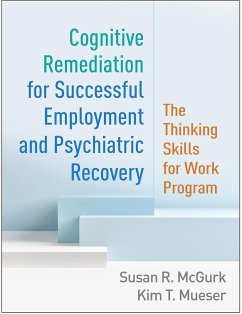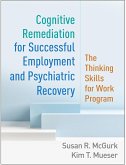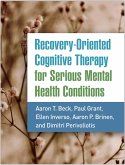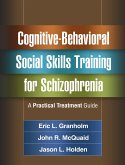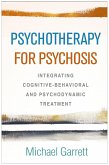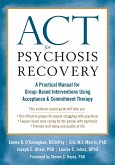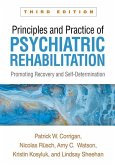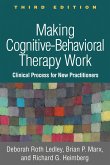Susan R McGurk, Kim T Mueser
Cognitive Remediation for Successful Employment and Psychiatric Recovery
The Thinking Skills for Work Program
Susan R McGurk, Kim T Mueser
Cognitive Remediation for Successful Employment and Psychiatric Recovery
The Thinking Skills for Work Program
- Gebundenes Buch
- Merkliste
- Auf die Merkliste
- Bewerten Bewerten
- Teilen
- Produkt teilen
- Produkterinnerung
- Produkterinnerung
From leading developers of psychosocial treatments for people with severe mental illnesses, this manual presents a research-based program proven to help participants acquire and sustain meaningful employment.
Andere Kunden interessierten sich auch für
![Cognitive Remediation for Successful Employment and Psychiatric Recovery Cognitive Remediation for Successful Employment and Psychiatric Recovery]() Susan R. McGurkCognitive Remediation for Successful Employment and Psychiatric Recovery59,99 €
Susan R. McGurkCognitive Remediation for Successful Employment and Psychiatric Recovery59,99 €![Recovery-Oriented Cognitive Therapy for Serious Mental Health Conditions Recovery-Oriented Cognitive Therapy for Serious Mental Health Conditions]() Aaron T BeckRecovery-Oriented Cognitive Therapy for Serious Mental Health Conditions78,99 €
Aaron T BeckRecovery-Oriented Cognitive Therapy for Serious Mental Health Conditions78,99 €![Cognitive-Behavioral Social Skills Training for Schizophrenia Cognitive-Behavioral Social Skills Training for Schizophrenia]() Eric L GranholmCognitive-Behavioral Social Skills Training for Schizophrenia57,99 €
Eric L GranholmCognitive-Behavioral Social Skills Training for Schizophrenia57,99 €![Psychotherapy for Psychosis Psychotherapy for Psychosis]() Michael Garrett (United States SUNY Downstate Medical Center)Psychotherapy for Psychosis65,99 €
Michael Garrett (United States SUNY Downstate Medical Center)Psychotherapy for Psychosis65,99 €![ACT for Psychosis Recovery ACT for Psychosis Recovery]() Emma K. O'DonoghueACT for Psychosis Recovery65,99 €
Emma K. O'DonoghueACT for Psychosis Recovery65,99 €![Principles and Practice of Psychiatric Rehabilitation, Third Edition Principles and Practice of Psychiatric Rehabilitation, Third Edition]() Patrick W. Corrigan (United State Illinois Institute of TechnologyPrinciples and Practice of Psychiatric Rehabilitation, Third Edition78,99 €
Patrick W. Corrigan (United State Illinois Institute of TechnologyPrinciples and Practice of Psychiatric Rehabilitation, Third Edition78,99 €![Making Cognitive-Behavioral Therapy Work Making Cognitive-Behavioral Therapy Work]() Deborah Roth Ledley (United States private practice)Making Cognitive-Behavioral Therapy Work41,99 €
Deborah Roth Ledley (United States private practice)Making Cognitive-Behavioral Therapy Work41,99 €-
-
-
From leading developers of psychosocial treatments for people with severe mental illnesses, this manual presents a research-based program proven to help participants acquire and sustain meaningful employment.
Hinweis: Dieser Artikel kann nur an eine deutsche Lieferadresse ausgeliefert werden.
Hinweis: Dieser Artikel kann nur an eine deutsche Lieferadresse ausgeliefert werden.
Produktdetails
- Produktdetails
- Verlag: Guilford Publications
- Seitenzahl: 372
- Erscheinungstermin: 30. April 2021
- Englisch
- Abmessung: 267mm x 203mm x 18mm
- Gewicht: 1043g
- ISBN-13: 9781462545988
- ISBN-10: 146254598X
- Artikelnr.: 60693969
- Herstellerkennzeichnung
- Libri GmbH
- Europaallee 1
- 36244 Bad Hersfeld
- gpsr@libri.de
- Verlag: Guilford Publications
- Seitenzahl: 372
- Erscheinungstermin: 30. April 2021
- Englisch
- Abmessung: 267mm x 203mm x 18mm
- Gewicht: 1043g
- ISBN-13: 9781462545988
- ISBN-10: 146254598X
- Artikelnr.: 60693969
- Herstellerkennzeichnung
- Libri GmbH
- Europaallee 1
- 36244 Bad Hersfeld
- gpsr@libri.de
Susan R. McGurk, PhD, is Professor in the Department of Occupational Therapy and the Department of Psychological and Brain Sciences at Boston University, where she is a faculty member at the Center for Psychiatric Rehabilitation. She is a clinical psychologist and neuropsychologist whose research focuses on the assessment and enhancement of cognitive and psychosocial functioning in people with severe mental illness. Dr. McGurk has over 100 publications in peer-reviewed journals. She is a recipient of the Gerard E. Hogarty Excellence in Schizophrenia Research Memorial Award from the University of Pittsburgh and the Rehabilitation Practitioner of Distinction Award from the National Rehabilitation Association for her pioneering work on cognitive remediation and employment in schizophrenia. Kim T. Mueser, PhD, is Professor in the Department of Occupational Therapy and the Department of Psychological and Brain Sciences at Boston University, where he is a faculty member at the Center for Psychiatric Rehabilitation. He is also Adjunct Professor of Psychiatry at the Geisel School of Medicine at Dartmouth. Dr. Mueser is a clinical psychologist whose clinical and research interests focus on treatment and rehabilitation of persons with schizophrenia and other serious mental illnesses. He has 300 publications in peer-reviewed journals and has coauthored more than 10 books and 100 book chapters. He is a recipient of the Michael S. Neale Award from Division 18 (Psychologists in Public Service) of the American Psychological Association.
Foreword, Robert E. Drake
Introduction
I. Background
1. Work, Cognitive Functioning, and Vocational Rehabilitation in People
with Mental Illness
2. Cognitive Enhancement
3. The Thinking Skills for Work Program
4. Engagement and Orientation
II. Assessment and Treatment Planning
5. Factors That Can Influence Cognitive Functioning
6. Assessment of Cognitive Challenges to Work
7. The TSW Service Plan
III. Cognitive Training
8. Logistics and Principles of Cognitive Training
9. Cognitive Training Methods
10. Strategy Coaching
IV. Cognitive Self-Management Strategies
11. Logistics and General Teaching Approach
12. Enhancing Motivation and Self-Efficacy
13. Enhancing Everyday Cognitive Functioning
V. Consultation
14. Job Search Consultation
15. Job Support Consultation
Appendix: TSW Handouts
References
Index
Introduction
I. Background
1. Work, Cognitive Functioning, and Vocational Rehabilitation in People
with Mental Illness
2. Cognitive Enhancement
3. The Thinking Skills for Work Program
4. Engagement and Orientation
II. Assessment and Treatment Planning
5. Factors That Can Influence Cognitive Functioning
6. Assessment of Cognitive Challenges to Work
7. The TSW Service Plan
III. Cognitive Training
8. Logistics and Principles of Cognitive Training
9. Cognitive Training Methods
10. Strategy Coaching
IV. Cognitive Self-Management Strategies
11. Logistics and General Teaching Approach
12. Enhancing Motivation and Self-Efficacy
13. Enhancing Everyday Cognitive Functioning
V. Consultation
14. Job Search Consultation
15. Job Support Consultation
Appendix: TSW Handouts
References
Index
Foreword, Robert E. Drake
Introduction
I. Background
1. Work, Cognitive Functioning, and Vocational Rehabilitation in People
with Mental Illness
2. Cognitive Enhancement
3. The Thinking Skills for Work Program
4. Engagement and Orientation
II. Assessment and Treatment Planning
5. Factors That Can Influence Cognitive Functioning
6. Assessment of Cognitive Challenges to Work
7. The TSW Service Plan
III. Cognitive Training
8. Logistics and Principles of Cognitive Training
9. Cognitive Training Methods
10. Strategy Coaching
IV. Cognitive Self-Management Strategies
11. Logistics and General Teaching Approach
12. Enhancing Motivation and Self-Efficacy
13. Enhancing Everyday Cognitive Functioning
V. Consultation
14. Job Search Consultation
15. Job Support Consultation
Appendix: TSW Handouts
References
Index
Introduction
I. Background
1. Work, Cognitive Functioning, and Vocational Rehabilitation in People
with Mental Illness
2. Cognitive Enhancement
3. The Thinking Skills for Work Program
4. Engagement and Orientation
II. Assessment and Treatment Planning
5. Factors That Can Influence Cognitive Functioning
6. Assessment of Cognitive Challenges to Work
7. The TSW Service Plan
III. Cognitive Training
8. Logistics and Principles of Cognitive Training
9. Cognitive Training Methods
10. Strategy Coaching
IV. Cognitive Self-Management Strategies
11. Logistics and General Teaching Approach
12. Enhancing Motivation and Self-Efficacy
13. Enhancing Everyday Cognitive Functioning
V. Consultation
14. Job Search Consultation
15. Job Support Consultation
Appendix: TSW Handouts
References
Index

